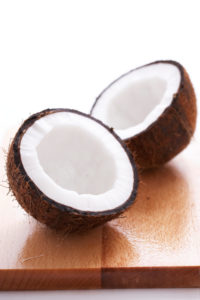
To eat coconut or not to eat coconut? Recently, the American Heart Association weighed in on the subject, issuing a Presidential Advisory statement urging Americans to avoid saturated fat, including saturated fat in the form of coconut oil. Given how popular coconut oil has become, this has led to an outcry of confusion from the public.
The AHA statement has prompted withering criticism from scientists, dieticians, and science writers working in the field of nutrition and public health who point out that the AHA only included four studies in their analysis, the majority of these studies were conducted in the 1960s, long before the differences between saturated fat and trans fat were understood (the two were often lumped together and simply classified as “saturated fat”) and long before the differences between “good” HDL cholesterol and “bad” LDL cholesterol were known. Recently, even the “bad” LDL cholesterol has been subdivided into “small and dense” vs. “light and fluffy” categories, with the former indicating an elevated risk of heart disease and the latter looking like it may be protectiveagainst heart disease. The four studies that the AHA used as a basis for forming their controversial statement did not take any of these factors into account.
Science writer and prolific nutrition author Gary Taubes has written a strong rebuke of the AHA’s statement: http://www.cardiobrief.org/2017/06/16/guest-post-vegetable-oils-francis-bacon-bing-crosby-and-the-american-heart-association/
Hilda Bastian, a writer, researcher, and former member of the Australian National Health and Medical Research Council wrote a post for The Public Library of Science disputing the AHA’s conclusions: http://blogs.plos.org/absolutely-maybe/2017/06/28/saturated-biases-where-the-aha-advice-on-coconut-oil-went-wrong/
Diana Rodgers, a registered dietician and host of The Sustainable Dish podcast, has also taken the AHA to task: http://sustainabledish.com/coconut-oil-wont-kill-listening-american-heart-association-might/?utm_source=The+Cultivator&utm_campaign=fa189b162b-EMAIL_CAMPAIGN_2017_06_27&utm_medium=email&utm_term=0_a401763ee6-fa189b162b-129521833
Jennifer K. Nelson, a registered dietician and writer for the Mayo Clinic who also co-editedThe Mayo Clinic Diet (among other books), wrote a post back in February of this year highlighting why it is not a good idea to switch from saturated fats like coconut oil to polyunsaturated omega-6 fats like soybean oil and corn oil:https://www.mayoclinic.org/healthy-lifestyle
It’s also worth noting that the AHA does not keep up with the latest nutritional recommendations. For example, everyone except the sugar industry agrees that sugar causes a myriad of health problems and that the less sugar you eat, the healthier you’ll be. Despite this, the AHA’s Heart-Check Food Certification Program (the AHA sells their checkmark to food manufacturers as a source of income—the checkmark is about business, not necessarily health) does not include a maximum allowable sugar limit for foods as a “Standard Certification” requirement when considering their eligibility for a checkmark. The AHA does not take sugar into consideration as a standard requirement. Under “Additional Food Category-Specific Requirements,” the AHA states: “Total sugar for yogurt is limited to 20 g or less per standard 6 oz serving.” But 6 ounces of Coca-Cola contains 17.4 g of sugar. The AHA says that yogurt can contain more sugar than Coca-Cola and still be considered healthy. Meanwhile, the World Health Organization recommends limiting sugar consumption to less than 25 g per day (not per yogurt).http://www.heart.org/HEARTORG/HealthyLiving/HealthyEating/Heart-CheckMarkCertification/Heart-Check-Food-Certification-Program-Nutrition-Requirements_UCM_300914_Article.jsp#.WVO_WOvyupo
The bottom line? It’s best to take what the AHA recommends with a grain of salt. And maybe a spoonful of coconut oil.


No Comments